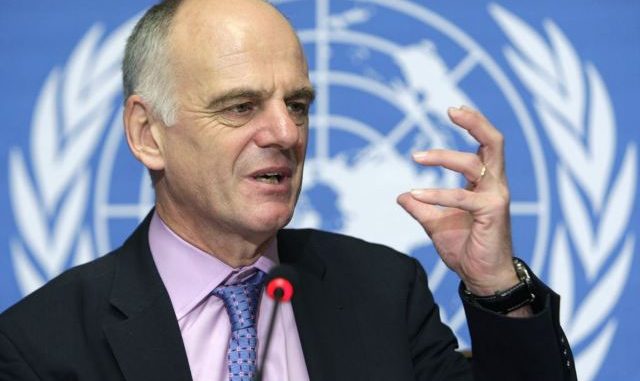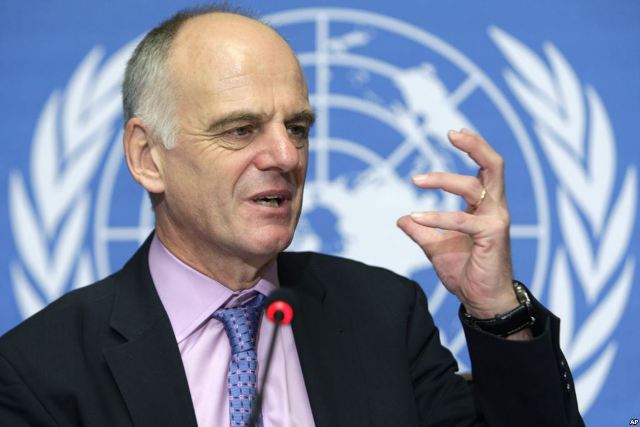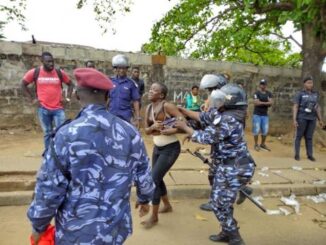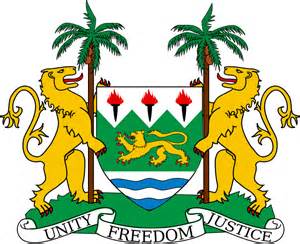
Speech by David Nabarro, United Nations Secretary-General’s Special Envoy on Ebola
Mr Chairman, Your Excellencies,
Thank you very much indeed, and I’d like to thank Members of the Executive Board as well for the opportunity to be here and speaking with you today. I’d like to address my remarks to the people and members of government and partners who are from the countries touched by the Ebola outbreak. I’d like to acknowledge the presence of fellow keynote speaker here Rebecca Johnson, whom I met in Hastings, Sierra Leone, in December.
I’d like to acknowledge Member of the Executive Board from Liberia, MoH, thank you for your leadership, sir. And also I’d would like to acknowledge the Permanent Representative of Sierra Leone who is sitting in the back, and also I believe representation of Guinea. Thank you for being here.
To Margaret Chan, Director-General of WHO, thank you for your extraordinary leadership and also for the opportunity to be here today. I would really like to appreciate the 24 / 7 hard work and commitment of officials from throughout WHO and the whole UN system as I start my remarks.
The Heads and staff from NGOs and other partner organizations, welcome, Members of the Diplomatic Corps, to ladies and gentlemen of the reporting press and to all colleagues engaged in this and other public health emergencies.
UN Secretary-General’s message
In this talk, I’m going to start by referring to a message that was sent yesterday to this meeting by Ban Ki-moon, UN Secretary-General and I’m then going to focus on the extraordinary number of organizations and professionals involved in the response, the changing response strategy, and future challenges.
“As we strive to end the outbreak, we must also draw the right lessons for the future.”
UN Secretary-General Ban Ki-moon
In the Secretary-General’s message to this Special Session, he says a number of important remarks, but I am just going to extract a few paragraphs: He says: “The people of Guinea, Liberia and Sierra Leone have been severely affected, and they have asked the world to come to their assistance.
A diverse coalition of governments, civil society organizations, development banks and philanthropic foundations continues to help the affected countries stop the spread of this cruel disease.
The United Nations system, combined with the strategic perspective of the World Health Organization, has had a central role in mobilizing and deploying funds and resources, through the essential short-term coordination provided by the UN Mission for Ebola Emergency Response.
Thanks to national leadership and community action, backed by the material, human and financial support from the international community, the number of new cases is declining. But ending the outbreak will require sustained commitment from the global coalition of actors. The United Nations system – with technical leadership of the WHO – will continue to work closely with the affected governments and all partners in the global response to achieve this objective”.
The Secretary-General continues:
“As we strive to end the outbreak, we must also draw the right lessons for the future. Migration, urbanization, population growth and growing pressure on natural habitats mean that increasing numbers of people are exposed to animal-to-human transmission of disease.
Although the world has successfully addressed threats such as SARS and avian influenza, this latest – and largest ever – Ebola outbreak has highlighted weaknesses, not just in the fragile developing nations but also in the global institutional machinery for identifying and quickly neutralizing health hazards.
We must ensure that the UN system has the capacity to prepare for and respond to future outbreaks, and that healthcare systems around the world have the capacity to withstand such shocks.
“I count”, says the Secretary-General, “on the vision and expertise of the WHO Executive Board not only to consider the steps needed to end the transmission of Ebola in West Africa but to adopt policies and structures to prepare for future pandemics and outbreaks. I also urge United Nations Member States to ensure that this indispensable World Health Organization has the resources it needs to do its work. I wish you a constructive and fruitful meeting”.
The full text of the Secretary-General statement is available online, I’ll ask that it can be made accessible via the WHO website as well.
Now to be more personal about what I have seen and been involved in since I started working as the UN system’s Special Envoy on Ebola. I was asked to do this job by the WHO Director-General and the Secretary-General of the United Nations on August 8th last year. Some of you know that I have worked here in WHO in emergencies and also with the United Nations on pandemics, but for me this latest assignment have been the most challenging and difficult that I have ever had.
Endemic Ebola virus disease in the human population of any country would have extreme societal, economic and political consequences. So from my perspective all of us involved in this response must commit to ensuring that the disease is fully eliminated in human populations and exists only in its animal reservoirs.
And at the same time, better defences must be established against the re-emergence of all manner of health risks – Ebola Virus Disease and beyond. And research on vaccines and treatments will be particularly helpful in future – especially for reducing health worker infections. But in the meantime, it is basic public health techniques that must be adopted.
My experience to date tells me that, for responses to have their greatest chance of success, they must be strategic, strong and speedy, they must be based on pre-arranged roles and responsibilities and they must use already-established systems. It is really difficult to establish new ways of working from scratch in the middle of an emergency, and we found that to our cost I think, in this latest outbreak.
There are three other principles that I think are important:
- people and their communities must be at the centre of the response – and they must own it;
- secondly, national authorities should be directing the response with the help of intergovernmental bodies, and they should never feel that they are losing control of the response;
- because a range of international actors will help when there is a crisis, coordination will be vital for all to have maximum impact. And because diseases do not respect borders, Member States should enable the response always to be implemented seamlessly across borders and boundaries.
From then to now: the current situation
Since early 2014, local community leaders, health workers, government officials and the national governments of affected countries have been leading the response to an expanding Ebola outbreak with unfailing support from international groups.
I would like – particularly – to mention non-governmental groups like Medecins Sans Frontieres, national Red Cross Societies who have been particularly prominent, but there are many other faith-based and secular groups who have quietly have been engaged for many months. The World Health Organization was involved in the response consistently from the start.
In August when it became clear that the outbreak was advancing rapidly within Guinea, Liberia and Sierra Leone – and extending sporadically into other nations – the United Nations system drew on the WHO Roadmap to develop what we call the STEPP strategy which is described in your documents.
International assistance was stepped up
The Peace and Security Committee of the African Union initiated its response initiative AESOWA (eventually offering up to 1000 volunteers); the UN Secretary General called for the whole of the UN system to support the response and – with WHO – set up the Public Health Mission (that Margaret Chan mentioned) UNMEER. This was endorsed by the UN General Assembly at the end of September under the chairmanship of its President Sam Kutesa, Foreign Minister of Uganda, and deployed early in October.
Following an extraordinary session of the UN Security Council, under US chairmanship, many donor governments and the European Union offered extraordinary financial, material, human and political support.
There have been major commitments by many – I would like to mention some though I know it is risky because I am bound to leave many out – but I’d like to start with the African Union and ECOWAS, who were there right from the start, the World Bank and the African Development Bank, who took extraordinary initiatives way beyond their mandates, and then the United States, France and the United Kingdom, who took high risks, for major engagement strategies in the three countries.
Major assistance has come from the European Union, Germany, Canada, Norway, Denmark, Sweden and Japan: many poor nations have also provided generous support that reflects extraordinary generosity given the other demands made on the resources at their disposal.
For many contributors, like China, this was their largest ever contribution to an international emergency. The Cuban Brigade was quickly dispatched bringing in more than 260 personnel. Philanthropic Foundations, especially the Paul Allen, Gates and Children’s Investment Fund Foundations, offered exceptional contributions too. The business sector mobilized to provide a wide range of support. The contributions of the UN Secretary-General Ebola Response Multi-Partners Trust Fund were appreciated.
To back up the pioneering and dangerous work of national responders, the Global Outbreak Alert and Response Network was fully mobilized.
Many teams of international medical personnel were recruited to help, major training programmes were initiated to encourage infection prevention and control, and special facilities for treating responders with Ebola (as well as for evacuating infected international personnel) were established. None of these were easy tasks. Overall it is an extraordinary response that has already involved more than 70 nations, hundreds of organizations, thousands of people and has cost at least $4 billion dollars to date.
And all of this has been achieved despite extensive restrictions on travel to and from the affected regions: we thank and pay tribute to the governments, companies and volunteer staff who have worked so hard to maintain air links throughout this period and to keep them safe.
The response has been carried out under the full gaze of national and international media, they have highlighted challenges, explored the complexities, identifying the trade-offs and enabling hundreds of millions of people throughout the world to be fully engaged in a health emergency, in the unfolding outbreak and in the response.
To encourage coordination of this multiple set of actors, the UN Secretary-General (in early September 2014) encouraged the establishment of a multi-partner Global Ebola Response Coalition. It just had its 15th weekly meeting and produced its report on the outlook for 2015 (on the UN Ebola Response website at http://ow.ly/HsFUe).
After 5 months of extraordinary and intense effort we now see that widespread changes in people’s behaviour, plus people’s better access to treatment and safer, dignified burials for all, have reduced risks of Ebola transmission and case numbers are declining.
But the situation remains perilous. Many communities are still reticent about being involved – they do not understand and are frightened of the outbreak: they do not trust those involved in the response.
Adjusting the response
The task of “getting to zero” requires a great deal of painstaking effort and really does mean careful detection work – building the confidence of the community, searching out people with the virus, caring for them and preventing them from passing on the disease to others.
And at the same time, its central services must be revived but it has to be done in ways that reduce the risks to workers and clients alike. Restarting education and basic health care in the context of an Ebola outbreak, even a declining one, is particularly challenging.
Members of the Executive Board and others who are engaged in this meeting,
I plead with you now to engage fully in the continuation of this strategy. This outbreak has not finished, it is very dangerous when we talk about it in the past tense. Although there are many less cases now than there were five months ago, as the Minister of Health of Liberia will testify, getting back, getting things working again, and getting to zero is going to be a hard and expensive, and human-resource intensive, task.
Please, stay engaged. Please contribute to the increasing number of flexible responses. Please help us to make sure that they are coordinated. Please let us adjust the response to the special conditions of urban areas like Monrovia, rural communities and border areas too.
Let’s always stay focused on the wellbeing of people who’ve got the disease, of their relatives and of the responders. Let us remember that hundreds of health workers have been seriously ill as a result of Ebola and too many have died. All people who have survived the disease, as well as their families, and relatives and orphans of those who have died, need to be able to access immediate and long-term support.
Excellences, Ladies and Gentlemen,
Let us do everything we can to avoid complacency. Let’s have a motto; “Ebola will not be gone in any country until it is gone from every country.”
The United Nations systems just completed its latest overview of needs and requirements, and it won’t surprise you to hear us saying that the whole UN system, including WHO, requires an extra $1 billion for 2015 for its role in ending the virus.
So, Mr Chair, Madame Director-General, on this extraordinary day, when we are looking at the conduct of the response and at the same time looking at the future, let us all recognise just what an extraordinary effort has been mounted by this world. How amazingly the different organizations and communities have dovetailed their work.
Let us recognize the leadership of the presidents of the affected countries, Johnson Sirleaf of Liberia, Ernest Bai Koroma of Sierra Leone, Alpha Condé of Guinea and also I.B. Keïta (Ibrahim Boubacar Keïta) of Mali, for what they themselves have managed to do.
Let us recognize the contribution of their people – particularly their health workers, and let’s make certain that for them, for those who died, for those who have been infected and survived, for all who suffered, we will now learn the lessons that are necessary.
Our objective should be that next time – and there will be a next time – we can do it so much better, with so much less cost and so much more resilience in the communities that are affected.
Thank you very much indeed.




